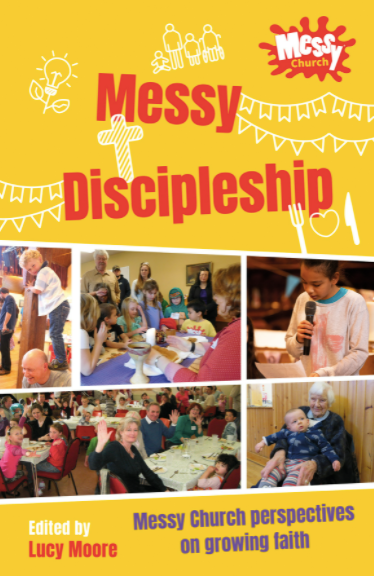Messy Discipleship by Lucy Moore
The book asks the question ‘does messy church create an environment that is likely to sustain lifelong, intentional Jesus-centred living for all ages?’ As many of us are in the process of a post-pandemic re-think about church, many of the points raised in this book are worth considering
 Messy Discipleship - Messy Church perspectives on growing faith
Messy Discipleship - Messy Church perspectives on growing faith
By Lucy Moore
BRF
ISBN: 9780857469533
Reviewed by Sandra Crawford
Here we have yet another book about Messy Church – but I have no problem with that. Messy church is the fastest-growing fresh expression of church in the UK, and from the earliest days Messy Church has been serious about researching and evaluating what they are about.
This book focuses on discipleship and is a collection of academic analysis and practitioner wisdom. The book asks the question ‘does messy church create an environment that is likely to sustain lifelong intentional Jesus centred living for all ages?’. The working definition of discipleship used is ‘an intentional following and learning from Jesus that is accompanied by specific actions that embody and encourage living in a Jesus way’.
I wholeheartedly agree with Lucy Moore’s frustration that Messy Church is still not viewed as proper church and the Biblical principle of all-age church is still only valued by the few. For so many their view of a perfect service is still the nostalgic dream of sending the kids out to Sunday School while we get on with proper church. Messy Church is not an activity we do to children and families occasionally as a feeder for the Sunday congregation, but it aims to be truly relational and intergenerational, where all benefit, all are equally valued and all give and receive.
How open are we as adults to growing, learning, and changing as a consequence of our relationships with children? Following five years of leading a Messy Church congregation, this book asks the questions I was asking, ‘if Messy Church is a congregation or church in its own right is there a challenge here for leaders to wholly commit to this and not be spread thinly across other church activities as well?’ If the team could focus just on Messy Church there would be more time for the team to disciple one another, learning and living the Biblical stories, and understanding how to communicate the story to those without any faith background.
As with many of the Messy Church books, each chapter leaves you with questions which can be considered by your team, and each book is a great resource to help you reflect, evaluate and plan. I wonder, do we ask the same questions of other areas of church life such as Sunday worship, midweek gatherings? As many of us are in the process of a post-pandemic re-think about church, many of the points raised in this book are worth considering.
Sandra Crawford is a pioneer minister in Jaywick
Baptist Times, 02/07/2021